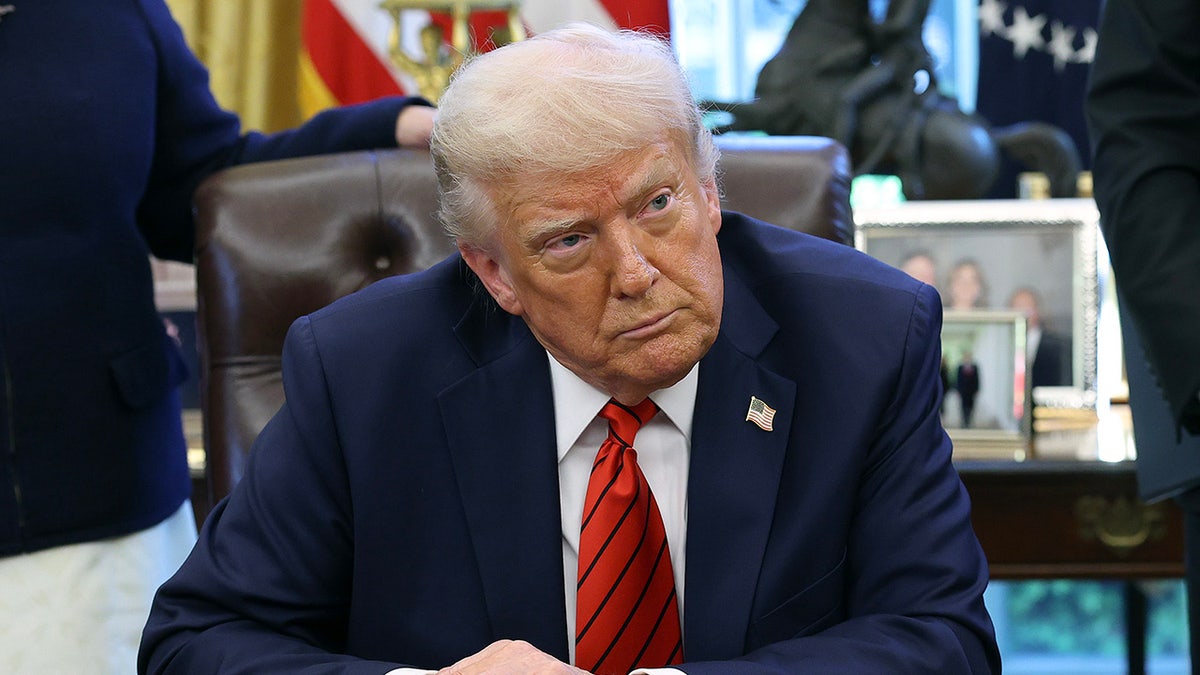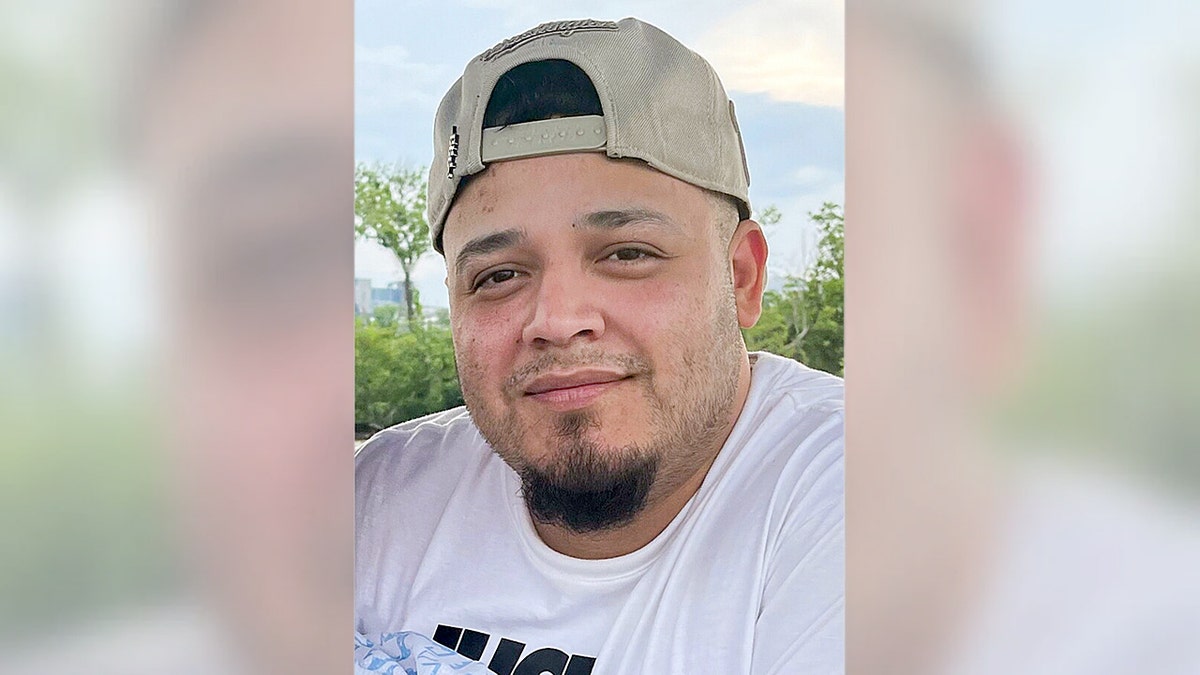NEWYou can now listen to Fox News articles!
BALTIMORE— – A federal judge in Baltimore cleared the way for potential contempt proceedings to be brought against the Trump administration on Tuesday after it failed to comply with a court order requiring it to return a deported Venezuelan migrant from El Salvador back to U.S. soil.
The update from U.S. District Judge Stephanie Gallagher capped an extraordinary court hearing centered on the status and location of “Cristian,” a 20-year-old Venezuelan migrant who was deported to El Salvador’s CECOT maximum-security prison in March, as part of the Trump administration’s early wave of Alien Enemies Act deportation flights.
Gallagher told Cristian’s lawyers on Tuesday that the flurry of recent updates in the case could allow plaintiffs to potentially move on sanctions or possible contempt proceedings against the Trump administration, though she stressed she was not opining on whether the effort would be successful.
“I don’t disagree that you have proffered a basis under which you could potentially seek some sort of sanctions or contempt” against the administration, Gallagher said. “I’m certainly not ruling on that – or offering any opinion on whether that effort would succeed – but it sounds to me that you have proffered a basis on which you believe such a motion could possibly be forthcoming.”
FEDERAL JUDGE EXTENDS ARGUMENTS IN ABREGO GARCIA CASE, SLAMS ICE WITNESS WHO ‘KNEW NOTHING’
She also stressed that, despite the procedural changes before the court, it does not mean they are “abandoning ship” in efforts to secure Cristian’s return to the U.S., though she acknowledged the situation on the ground had shifted significantly.
Gallagher, a Trump appointee, had ruled in April that Cristian’s deportation violated a settlement agreement that the Department of Homeland Security struck last year with a group of young asylum seekers. Under the 2024 deal, DHS agreed not to deport members of that class until their asylum claims could be fully adjudicated by a U.S. court.
The hearing sharply underscored the fast-changing fact pattern underpinning Cristian’s custodial status. Days earlier, Cristian was deported from CECOT, in El Salvador, to his home country of Venezuela.
Gallagher said Tuesday that the new situation has put the court “in a different posture” compared to its position just one week ago.
Lawyers for Cristian argued on Tuesday that his removal to Venezuela, which they had no prior notice of, should be grounds to move on holding the Trump administration in criminal contempt. Gallagher did not rule it out.
In Gallagher’s ruling four months ago, she determined that Cristian’s removal was a “breach of contract” due to the settlement terms of the 2024 DHS deal. She then ordered the Trump administration to facilitate his return to the U.S.
But as Tuesday’s hearing made clear, Daniel Lozano-Camargo, the migrant referred to in court documents as “Cristian,” is not on his way to the U.S. from CECOT.
In fact, Justice Department lawyers confirmed Tuesday that he was deported from CECOT back to his home country of Venezuela on Friday along with 251 other Venezuelan migrants, whom the Trump administration deported from the U.S. to El Salvador in March under the auspices of a wartime immigration law used just three times previously in U.S. history.
Their return to Venezuela was part of a prisoner swap made on Friday in order to secure the release of 10 Americans detained in that country. U.S. Secretary of State Marco Rubio confirmed the swap in a social media post later that evening.
The decision to deport 252 Venezuelan nationals sent by the U.S. to CECOT back to their country of origin has raised profound concerns from immigration advocates.
To date, there is little public information available about the identity of the migrants deported by the Trump administration to El Salvador in March. It is unclear if – or how many – migrants removed to the CECOT prison might have been under “withholding of removal” orders from a federal judge, which would block the U.S. from deporting them back to Venezuela.
Cristian’s lawyer, Kevin DeJong, on Tuesday upbraided the Trump administration for its “blatant disregard” for Gallagher’s court order, and described his inclusion in the prisoner swap as an “egregious violation” of the court.
FEDERAL JUDGE JAMES BOASBERG FINDS PROBABLE CAUSE TO HOLD TRUMP IN CONTEMPT OVER DEPORTATION FLIGHTS

The Trump administration, plaintiffs said Tuesday, sent Cristian to Venezuela, “the country he is seeking asylum from,” without providing any notice to the court or to his legal team until after he was on the ground. They said they were first notified late Friday.
DeJong told the court that Cristian’s removal to Venezuela appears to have been in the works for several weeks – suggesting, in their view, that the Trump administration may have taken “active, purposeful steps to deport [Cristian] to the country from which he fears persecution.”
“I do not say this lightly, and it’s a weighty issue to consider, but given the history of violations here, criminal contempt should be on the table,” DeJong said.
Gallagher did not immediately discount that option, though she noted it would only come after a separate discovery process into the government’s behavior.
“We’re in a different position now,” Gallagher said, nodding to what she described as the court’s “unusual” procedural situation.
She also stressed that the court still does not have an answer on whether the Trump administration attempted to comply with the court’s order to facilitate Cristian’s return to the U.S., or whether it even made such a request to the government of El Salvador.
“We do not know if that happened or not,” Gallagher told Justice Department attorney Ruth Ann Mueller.
The Justice Department attempted, unsuccessfully, to argue that the matter is moot.
“No, that doesn’t comply with my order,” Gallagher sharply objected. “That doesn’t answer the question.”
After a short recess, lawyers for Cristian told Gallagher they would file appropriate sanctions-related measures within the next 10 days.
In the interim, Gallagher said, she will require the Trump administration to file weekly status reports on Cristian’s status in Venezuela, beginning this Friday.
100 DAYS OF INJUNCTIONS, TRIALS AND ‘TEFLON DON’: TRUMP SECOND TERM MEETS ITS BIGGEST TESTS IN COURT
The hearing on Tuesday was relatively short, though not insignificant.
In one remarkable exchange, lawyers for the Justice Department argued that any continued discussions or discovery in the case – including attempts to ascertain Cristian’s status in Venezuela – are “outside the scope” of the court.
Gallagher interjected to note that sanctions discoveries, and motions to compel, would allow the court to consider the Trump administration’s “overarching conduct” in the case.

The case bears many similarities to the case of Kilmar Abrego Garcia, a Salvadorian migrant wrongfully deported to El Salvador in March and ordered by a federal judge to be returned to the U.S.
Like Abrego Garcia, Cristian remained in El Salvador for months, despite a court order demanding his return and requiring the administration to file regular updates to his status in order to determine compliance with the order.
But Tuesday’s motions hearing – and the blitz of court filings submitted to Gallagher in recent days – underscored the very different situation that has played out instead.
“Cristian was a pawn in this plan,” DeJong said on Tuesday, noting that the government took “active purposeful steps to deport him” despite the court order, and with apparent prior knowledge.
“They could have included him” on the flight back to the U.S. with Abrego Garcia, he argued.
Instead, DeJong said, the “only reasonable inference we see is that the government attorneys willfully disregarded” the court.
Gallagher in May declined to grant the Trump administration’s request for her to lift her order requiring them to return Cristian. She stressed that her order has nothing to do with the strength of his asylum request, in a nod to two apparent low-level drug offenses and a conviction as recently as January.
Rather, she said, it is about allowing him due process under the law, and under the settlement struck with DHS.
She said it was not a case of whether Lozano-Camargo would eventually receive asylum – it was a question of process.
The DHS settlement agreement “requires him to be here and have his hearing,” she said then.
Read the full article here